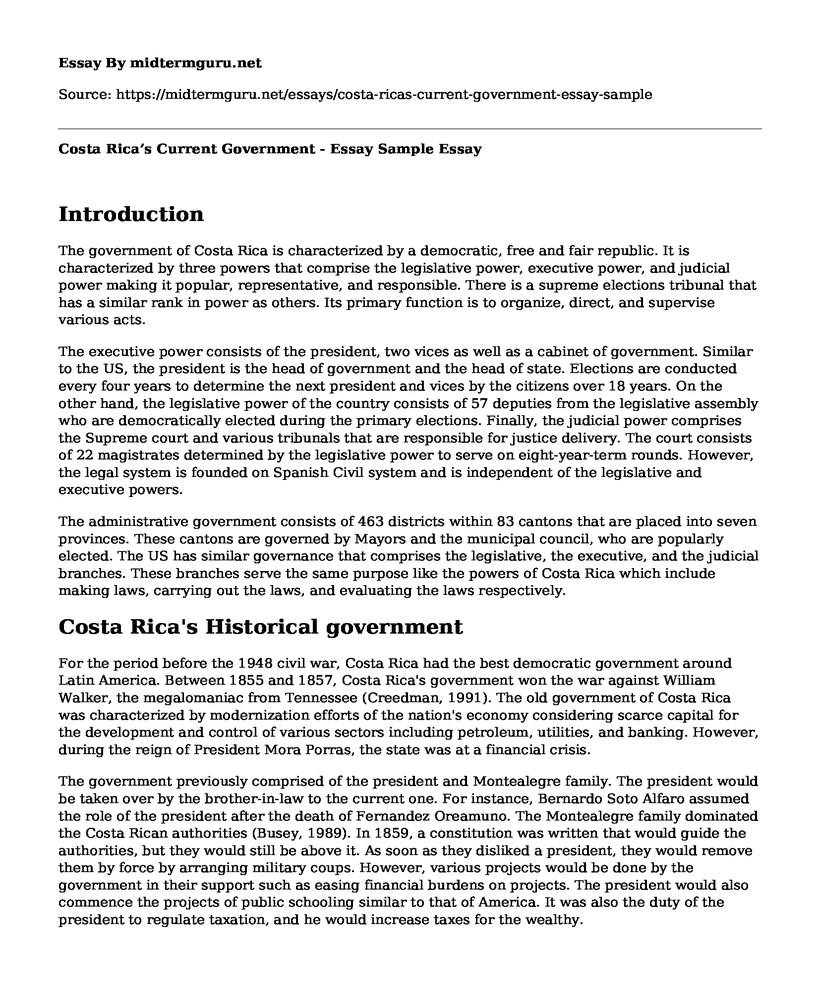Introduction
The government of Costa Rica is characterized by a democratic, free and fair republic. It is characterized by three powers that comprise the legislative power, executive power, and judicial power making it popular, representative, and responsible. There is a supreme elections tribunal that has a similar rank in power as others. Its primary function is to organize, direct, and supervise various acts.
The executive power consists of the president, two vices as well as a cabinet of government. Similar to the US, the president is the head of government and the head of state. Elections are conducted every four years to determine the next president and vices by the citizens over 18 years. On the other hand, the legislative power of the country consists of 57 deputies from the legislative assembly who are democratically elected during the primary elections. Finally, the judicial power comprises the Supreme court and various tribunals that are responsible for justice delivery. The court consists of 22 magistrates determined by the legislative power to serve on eight-year-term rounds. However, the legal system is founded on Spanish Civil system and is independent of the legislative and executive powers.
The administrative government consists of 463 districts within 83 cantons that are placed into seven provinces. These cantons are governed by Mayors and the municipal council, who are popularly elected. The US has similar governance that comprises the legislative, the executive, and the judicial branches. These branches serve the same purpose like the powers of Costa Rica which include making laws, carrying out the laws, and evaluating the laws respectively.
Costa Rica's Historical government
For the period before the 1948 civil war, Costa Rica had the best democratic government around Latin America. Between 1855 and 1857, Costa Rica's government won the war against William Walker, the megalomaniac from Tennessee (Creedman, 1991). The old government of Costa Rica was characterized by modernization efforts of the nation's economy considering scarce capital for the development and control of various sectors including petroleum, utilities, and banking. However, during the reign of President Mora Porras, the state was at a financial crisis.
The government previously comprised of the president and Montealegre family. The president would be taken over by the brother-in-law to the current one. For instance, Bernardo Soto Alfaro assumed the role of the president after the death of Fernandez Oreamuno. The Montealegre family dominated the Costa Rican authorities (Busey, 1989). In 1859, a constitution was written that would guide the authorities, but they would still be above it. As soon as they disliked a president, they would remove them by force by arranging military coups. However, various projects would be done by the government in their support such as easing financial burdens on projects. The president would also commence the projects of public schooling similar to that of America. It was also the duty of the president to regulate taxation, and he would increase taxes for the wealthy.
Costa Rican government was also covered by various acts such as the Alien Properties Act that would allow for confiscation of property not belonging to the locals (Creedman, 1991). The government was also supported by various forces such as the Figueres' forces and the War of National Liberation. It was after the Civil War that the governmental power was reviewed and relinquished to comprise the president and national assembly.
References
Busey, J. L. (1989). The presidents of Costa Rica. The Americas, 18(1), 55-70.
Creedman, T. S. (1991). Historical Dictionary of Costa Rica(Vol. 16). Scarecrow Press.
Cite this page
Costa Rica's Current Government - Essay Sample. (2022, Dec 21). Retrieved from https://midtermguru.com/essays/costa-ricas-current-government-essay-sample
If you are the original author of this essay and no longer wish to have it published on the midtermguru.com website, please click below to request its removal:
- Essay Sample on Hopeful Realism in Urban Ministry by Morris
- The US Relationship with Mexico and Central America - Paper Example
- Communicative Dimension of Donald Trumps Leadership Style - Essay Sample
- Essay on the Role and Significance of Constitutions
- Personal Statement: International Relations
- Diplomacy - Essay Sample
- Cures Act of 2016: Accelerating Innovations & Treatments for Patients - Essay Sample







